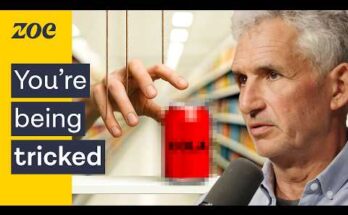## The Shocking Truth About Ultra-Processed Foods: A Harvard Doctor Reveals All
We’ve all been there, grabbing a quick and convenient meal or snack on the go. But are those seemingly harmless choices silently contributing to serious health problems? A recent insightful discussion with Dr. Andy Chan, a Harvard professor and leading expert in gut health and cancer prevention, sheds alarming light on the impact of ultra-processed foods (UPFs) on our health. This blog post will unpack the key takeaways from his interview, revealing the hidden dangers lurking in many of our everyday food choices.
### The Staggering Statistics: Just How Much UPF Are We Eating?
Dr. Chan’s discussion starts with a sobering statistic: ultra-processed foods now constitute over half of the average person’s diet. This isn’t just a matter of convenience; it’s a significant contributor to a range of health issues. The long-term effects are only now becoming fully understood, revealing a far more complex picture than simply calorie counting. Research cited in the interview, such as the study published in *The Journal of Nutrition*, highlights the dramatic increase in UPF consumption over recent years.
### The Hidden Links: UPFs, Inflammation, and Disease
The video delves deep into the mechanisms by which UPFs negatively affect our bodies. Dr. Chan explains how these foods trigger inflammation, a process linked to numerous diseases including obesity, type 2 diabetes, and colorectal cancer. He emphasizes that the impact extends beyond simple calorie intake; the *type* of calories and the ingredients within UPFs play a crucial role. This is where the gut microbiome comes into play, with the professor detailing how UPFs disrupt the delicate balance of this vital ecosystem.
### Are Food Companies Engineering Addiction?
A particularly concerning point raised is the potential for food companies to be engineering food addiction. Dr. Chan explores the possibility that the highly palatable nature of many UPFs, often achieved through carefully formulated combinations of sugar, salt, and fat, could be contributing to overconsumption and making it difficult for people to make healthier choices. This aspect underscores the ethical considerations surrounding the widespread availability and marketing of these products.
### The Impact on Children: A Growing Concern
The implications for children are particularly alarming. The interview discusses studies, including research published in the *European Journal of Nutrition*, showing a link between early exposure to UPFs and increased risk of childhood illnesses and earlier onset of chronic diseases. This highlights the importance of establishing healthy eating habits from a young age and the crucial role parents play in shaping their children’s dietary choices. The lasting effects of a mother’s diet during pregnancy are also discussed, underscoring the transgenerational impact of UPF consumption. The video even goes so far as to compare the potential harm of a poor diet during pregnancy to that of smoking.
### Beyond Calories: Understanding the Nuances of UPFs
The discussion challenges the simplistic notion of calorie counting. Dr. Chan explains that focusing solely on calories ignores the significant differences in the nutritional composition and biological effects of various foods. He highlights how some foods might appear “healthy” on the surface but contain hidden ingredients that contribute to inflammation and disease. The interview introduces ZOE’s new processed food risk scale, a tool designed to help individuals better understand the potential risks associated with different UPFs.
### Identifying and Avoiding UPFs: Practical Tips and Strategies
The video doesn’t end on a pessimistic note. Dr. Chan offers practical advice on how to identify and reduce UPF consumption. This includes decoding often misleading food labels and providing simple tricks to spot UPFs at a glance. He also advocates for creating UPF-free zones in schools and workplaces to promote healthier choices and reduce exposure, particularly amongst children. The discussion emphasizes the power of conscious choices and the importance of prioritizing whole, unprocessed foods.
### Conclusion: Taking Control of Your Health
Dr. Chan’s interview serves as a wake-up call, urging us to critically examine our dietary habits. By understanding the impact of ultra-processed foods, we can make informed decisions to protect our health and the health of our families. The resources linked in the video description offer further support and guidance on navigating the complex landscape of food choices and building a healthier relationship with food. It’s time to take control and choose a path towards a healthier future.


